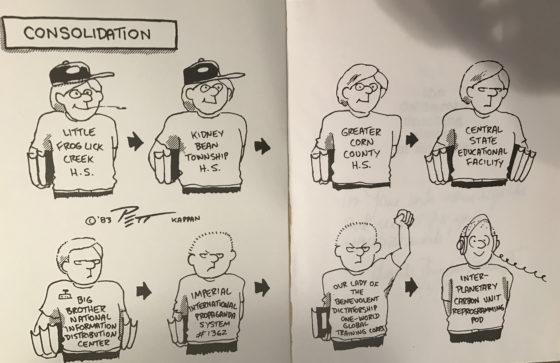Regionalism-Communism In Spades By Joel Pett, Pulitzer Prize Cartoonist, Published By Phi Delta Kappa, 1983. This Cartoon Is One Inside Of Front And Back Covers Of The Deliberate Dumbing Down Of America, 1999 And 2011, but not visible in archived or PDF versions
Click on picture for larger view…
Article dated 1975 by Morris Zeitlin, below, explains exactly what is and has been going in the United States (in every state) under the label of “Consolidation” or “Regional Government” ever since the 1960s!
This particular article received and still receives a 100 percent, very effective boycott in the USA. No wonder!!!!!!!!!
The adjective “communism” or “communist” is very rarely used since President Reagan, in 1985 and 1989, signed the United States-USSR Education and Cultural Exchange agreements with Soviet President Gorbachev, which merged the two nations’ systems. The tax-exempt Carnegie Corporation, at the same time, in 1985, negotiated an extensive agreement with the Soviet Academy of Science related to computer instruction, exchanges, etc.
The word “communism” has successfully been removed from any scholarly articles related to “communism”.
A very good explanation of gradual changes taking place in USA government (unbeknownst to the average American) between 1965 and 2021 can be found in the following article by sociologist Morris Zeitlin, published in the communist Daily World, 1975:
From 3D book, page 134:
THE DAILY WORLD OF NOVEMBER 8, 1975 CARRIED A VERY INTERESTING ARTICLE ENTITLED “Planning Is Socialism’s Trademark” by Morris Zeitlin. The Daily World (newspaper of the Communist Party USA) was formerly known as The Daily Worker and was founded in 1924. The importance of this article lies in its blatant admission that regionalism, which is gradually becoming the accepted method of unelected governance in the United States (unelected councils and task forces, participatory democracy, public-private partnerships, etc.) is the form of government used in democratic socialist and communist countries. The following are excerpts from this article:
Cities in industrially advanced countries develop complex economic, social and political interaction. In this process, major cities tend to consolidate neighboring smaller cities and settlements into metropolitan regions. Rationally, metropolitan regions should constitute governmental units having comprehensive planning and administrative powers within their boundaries.
In our country (the United States), rival capitalist groups, jealously guarding their special prerogatives, have rigidly maintained the traditional boundaries of states and counties while national economic and social development has created metropolitan regions that overlap those boundaries. We have no regional government and no comprehensive regional planning to speak of. Regional government and planning remain concepts our urban scholars and planners have long advocated in vain…
In socialist countries, metropolitan regions enjoy metropolitan regional government and comprehensive planning. Of the many regions on the vast territory of the Soviet Union, the Moscow Region commands special attention, for it has been, since the 1917 Revolution, the country’s economic and political center.
The economic and functional efficiencies and the social benefits that comprehensive national, regional and city planning make possible in socialist society explain the Soviet Union’s enormous and rapid economic and social progress. Conversely, our profit-oriented ruling capitalist class makes comprehensive social and economic planning impossible, causing waste and chaos and dragging the entire nation into misery and suffering as its rule deteriorates and declines.
